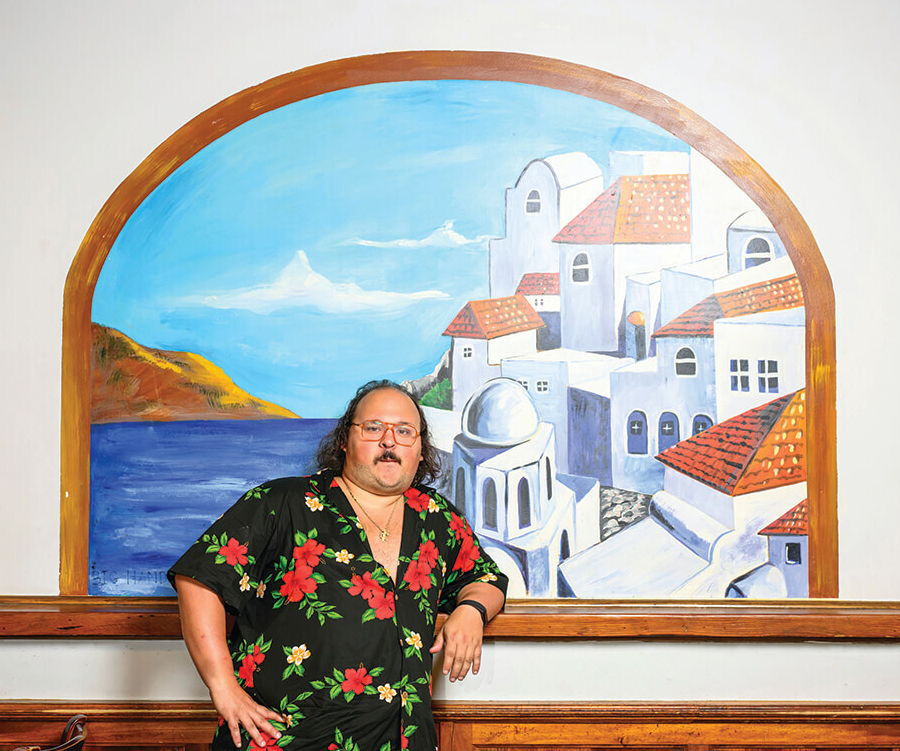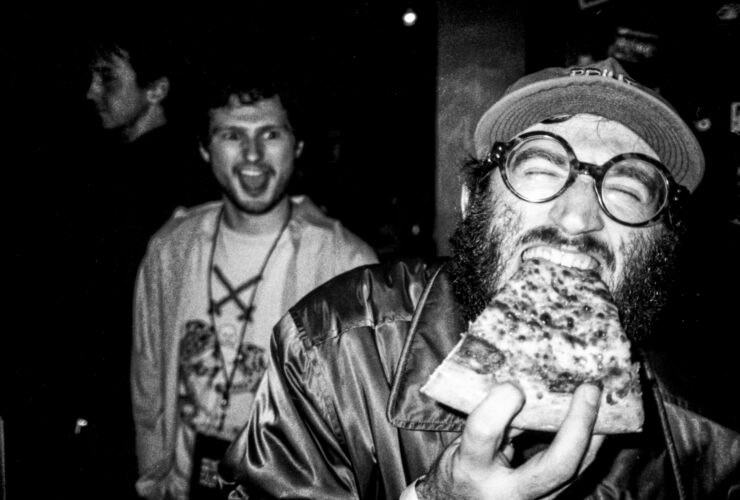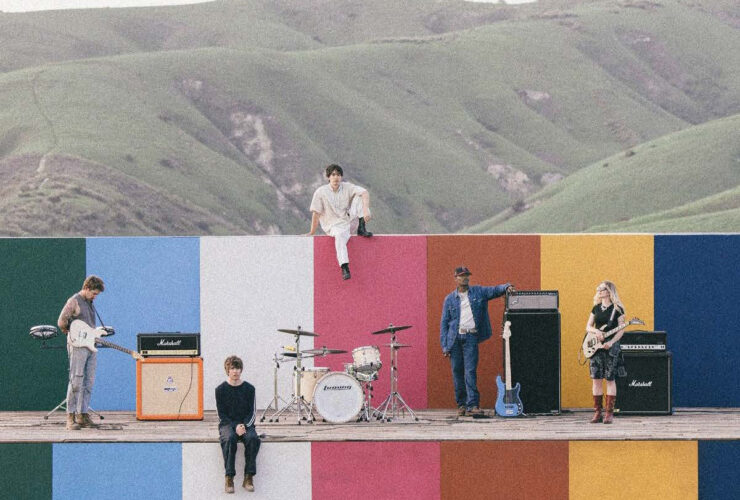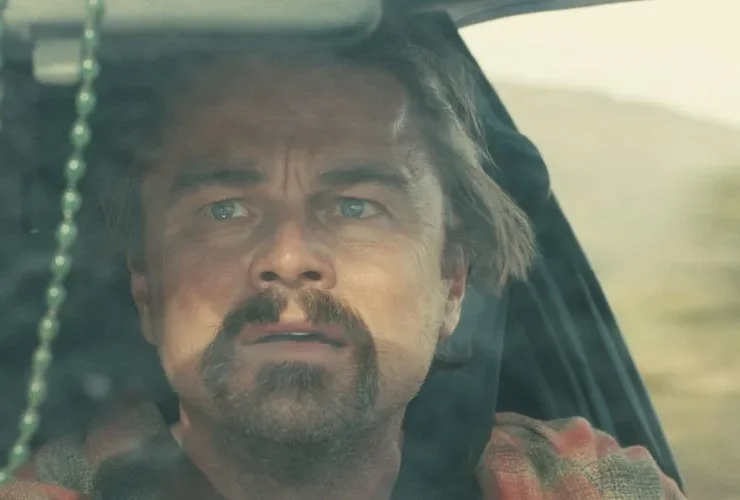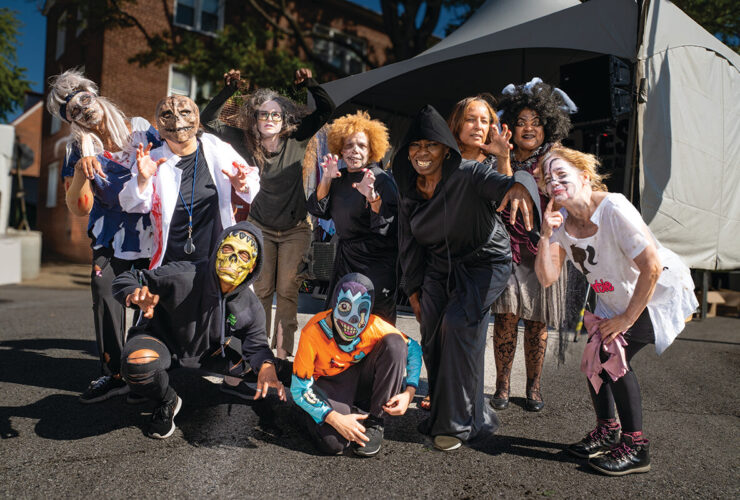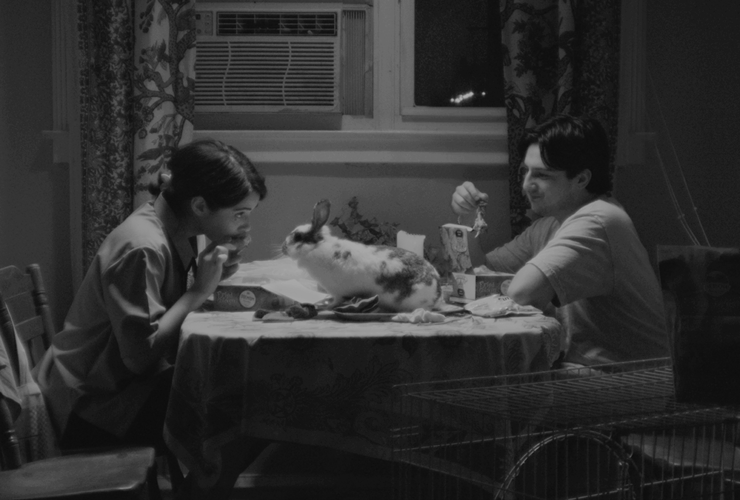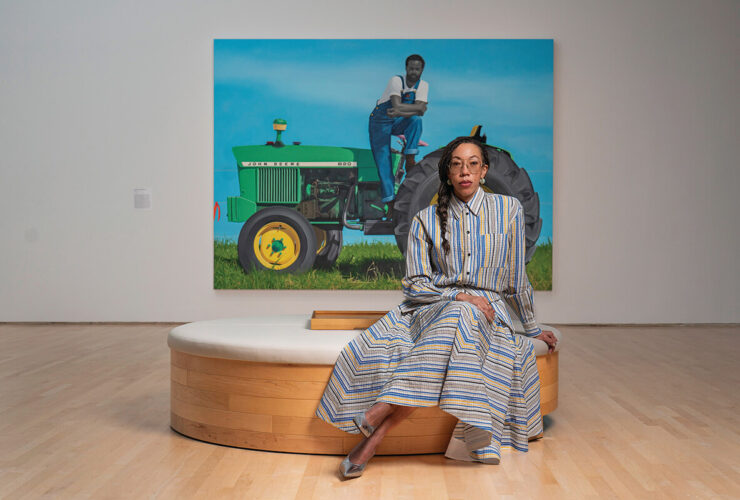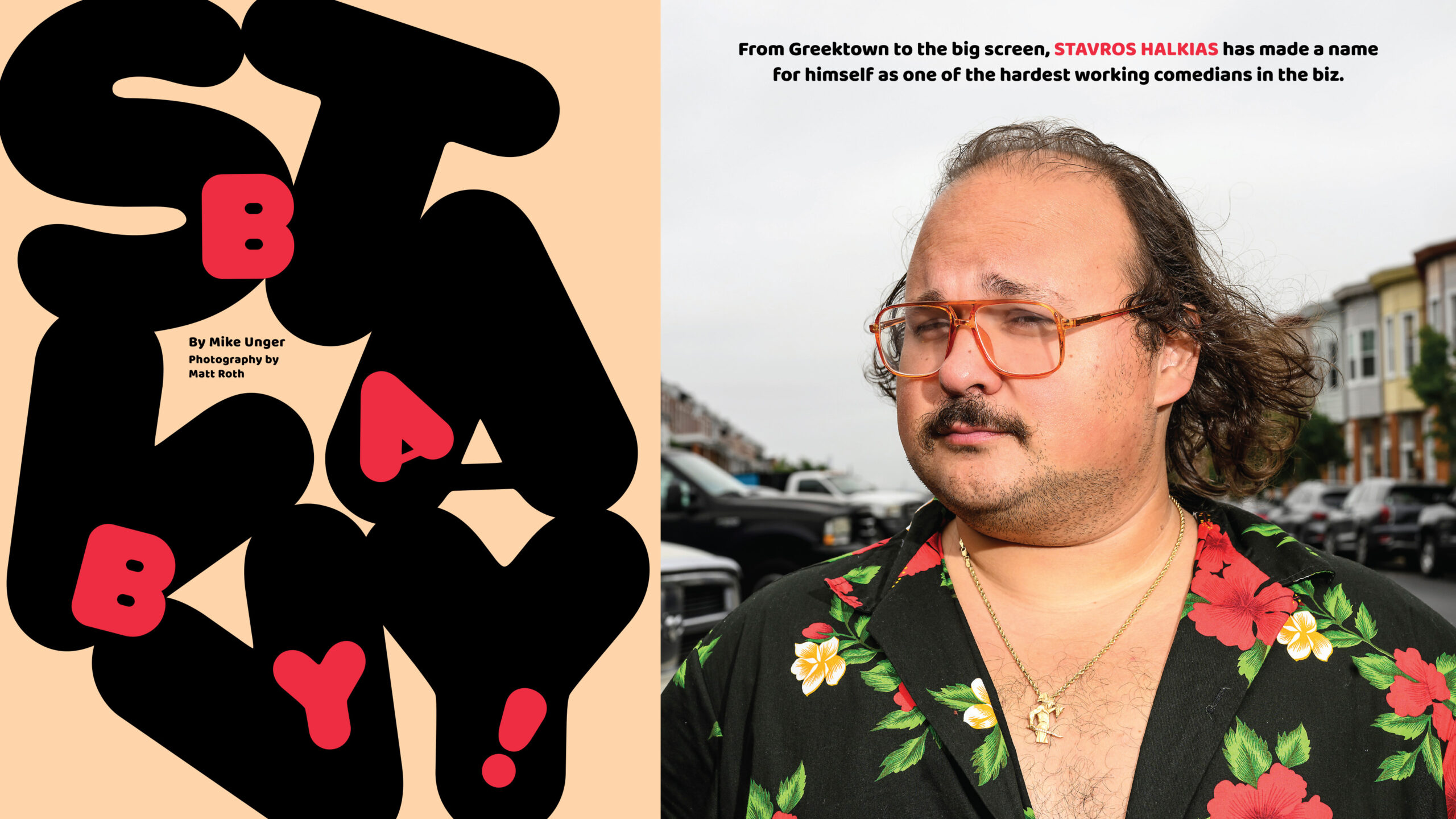
Arts & Culture
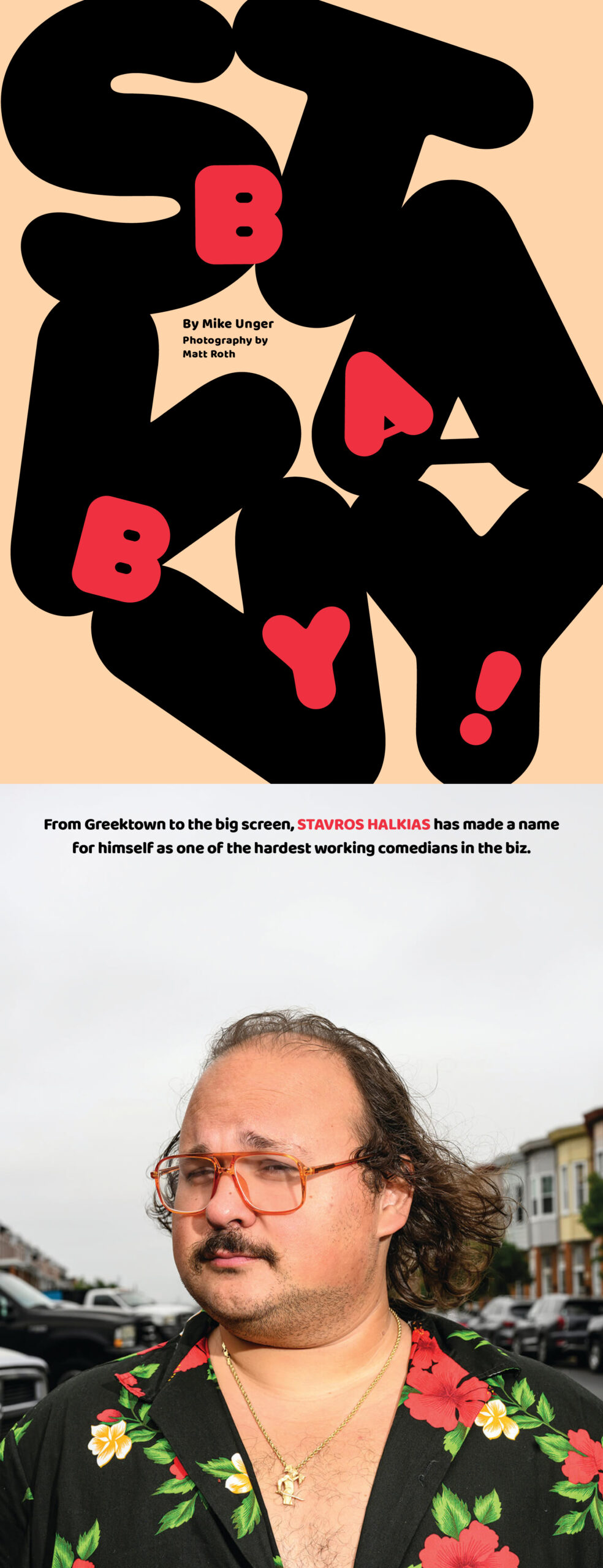

Mementos from The Dreamboat Tour are strewn throughout the Canton rowhome of Stavros Halkias. A poster touting his April show at Nashville’s historic Ryman Auditorium, his name written in the same iconic style as the entertainment legends who graced its stage before him. A souvenir life buoy from the Paramount Theatre in Denver. Somewhere upstairs is a track suit, a gift from the Warner Theatre in Washington, D.C.
The dreamboat in question is characteristically dressed down, wearing shorts, a half-buttoned, blue-floral Hawaiian shirt, and large ’70s-style eyeglasses that sit low on his nose. A chain with a pendant of the Greek hero Perseus holding the head of Medusa dangles from his neck. He seems, on this mid-May Tuesday, either really relaxed or utterly exhausted—which would be understandable, considering he’s just wrapped up 60 stand-up comedy shows at 45 venues in 80 days.
Over the last few years, “Stavvy,” as he’s affectionately known to his ever-swelling legion of fans, has become a notable name in Baltimore, and it’s increasingly becoming a memorable one elsewhere as well. The spring leg of his tour ended two days ago in front of a sellout crowd at the Warner, a few blocks from The White House. His fans, including plenty wearing Ravens purple and Orioles orange, were rapt over his every word from the moment he stepped on stage to a raucous ovation and began his 70-minute set by poking fun at Washingtonians, then his own roundish build: “It’s hard when you’re fat, because your body doesn’t even believe in you. If you lose weight, it keeps around all that extra skin. It’s almost like it’s saying, ‘I got a hunch you’re gonna fill this up with ice cream. Let’s not do anything hasty here.’”
D.C. audiences can be tricky, but Halkias’ act is more primal than political. The young, testosterone-soaked crowd lapped up his R-rated, sometimes boorish, often brainy musings on sex, food, and fatness, with a little billionaire bashing mixed in.
“The energy was incredible. They were a great crowd. You couldn’t ask for more,” says Halkias, who’s sitting on a bench in his narrow backyard. There’s a small structure near the alley that he’s thinking about one day turning into a studio, but other than Christmas lights dangling in the living room and some art on the walls (including a work by the American painter Alvin Hollingsworth that he bought at Galerie Myrtis in Old Goucher), the house is sparsely decorated.
Let’s pause momentarily for a disclaimer. As the rest of this story is about to make clear, if you’re offended by profanity, Halkias isn’t the comic for you. He doesn’t go out of his way to cuss, but colorful words are so naturally sewn into his vernacular that seldom does a minute or two pass without one spewing from his mouth.
He continues. “I never thought I’d be doing a theater tour, let alone my second theater tour in a couple of years. I’m so fucking lucky.”
Good fortune, of course, is partly responsible for Halkias’ rapidly rising stardom. Everyone needs a break along the way, and Halkias, 36, certainly has gotten one or two during his journey from Greektown—where he was raised by parents who emigrated to Baltimore from Greece—to the upper echelon of the comedy universe.
But don’t let his humility or self-deprecation distract from his innate intelligence, talent, and work ethic. Those are the traits that have led to successes that keep coming with increasing frequency, like his popular podcast Stavvy’s World, his role as the often-snacking Dave in the hit Netflix series Tires (the second season dropped in June), and this tour, which sold more than 82,000 tickets. Recently he’s appeared with John Waters, Wanda Sykes and former Acting U.S. Solicitor General Neal Katyal (has there ever been a more eclectic quartet of talk-show guests?) on Everybody’s Live with John Mulaney and eaten chicken wings on Hot Ones. “Brother,” he told host Sean Evans, “I’m the most prepared guest you’ve ever had in your life.”
On television and onstage, Halkias favors a casual look, preferring Sopranos-esque leisure suits to business ones. Off it, he’s not afraid to ditch his clothes entirely. His 2025 calendar, available for $25 on his website, features nude photos of the jiggly comedian with strategically placed props. For February, he’s photoshopped onto a mountain, where’s he skiing with only a large scarf covering his self-described “small package.”
“I would kill to look that fucking funny,” says his friend and fellow stand-up Sam Morril. “A lot of times people have that look, and they just don’t deliver. And a lot of people think just being funny is enough—it’s not. You really have to work at it, and he does. He’s got every quality you would want in a comedian. He’s hilarious. He’s a generous laugher. He writes great jokes. He digs deeper.”
In these initial days following the tour, Halkias is conflicted. Part of him wants to hibernate for a week, while another knows that there’s always more work to be done. Podcast guests need to be booked, acting roles pursued, business matters attended to. He’s also looking for a new apartment in Manhattan, where he spends most of his time when he’s not on the road. But the art of stand-up is always forefront on his mind. Revisiting and analyzing his performances are on his agenda in the coming weeks.
“I’ll do my final sort of exit interview with myself, where I’m really granular and catalog every laugh I get,” he says. “I always look at where I am in the lifecycle of an hour. It’s kind of like when you’re working out. You’re either cutting or you’re bulking. Then it becomes these micro things, where you’re taking one word out of a setup to see if it affects the punchline. It starts with the germ of an idea, and then you’re adding a tag every night, and maybe you’re experimenting with what you’re doing with your face and what you’re doing with your volume. Are you yelling? Are you quiet? I think about this stuff all the time.”
It shows. By the end of the D.C. set, the audience was in a frenzy. Near the finale, when Halkias riffed on his hopes and dreams for his 4-month-old nephew—including a penis bigger than his—the laughs were louder than they’d been all night.
OPENING IMAGE: Stavros Halkias walks around his old neighborhood in Greektown.
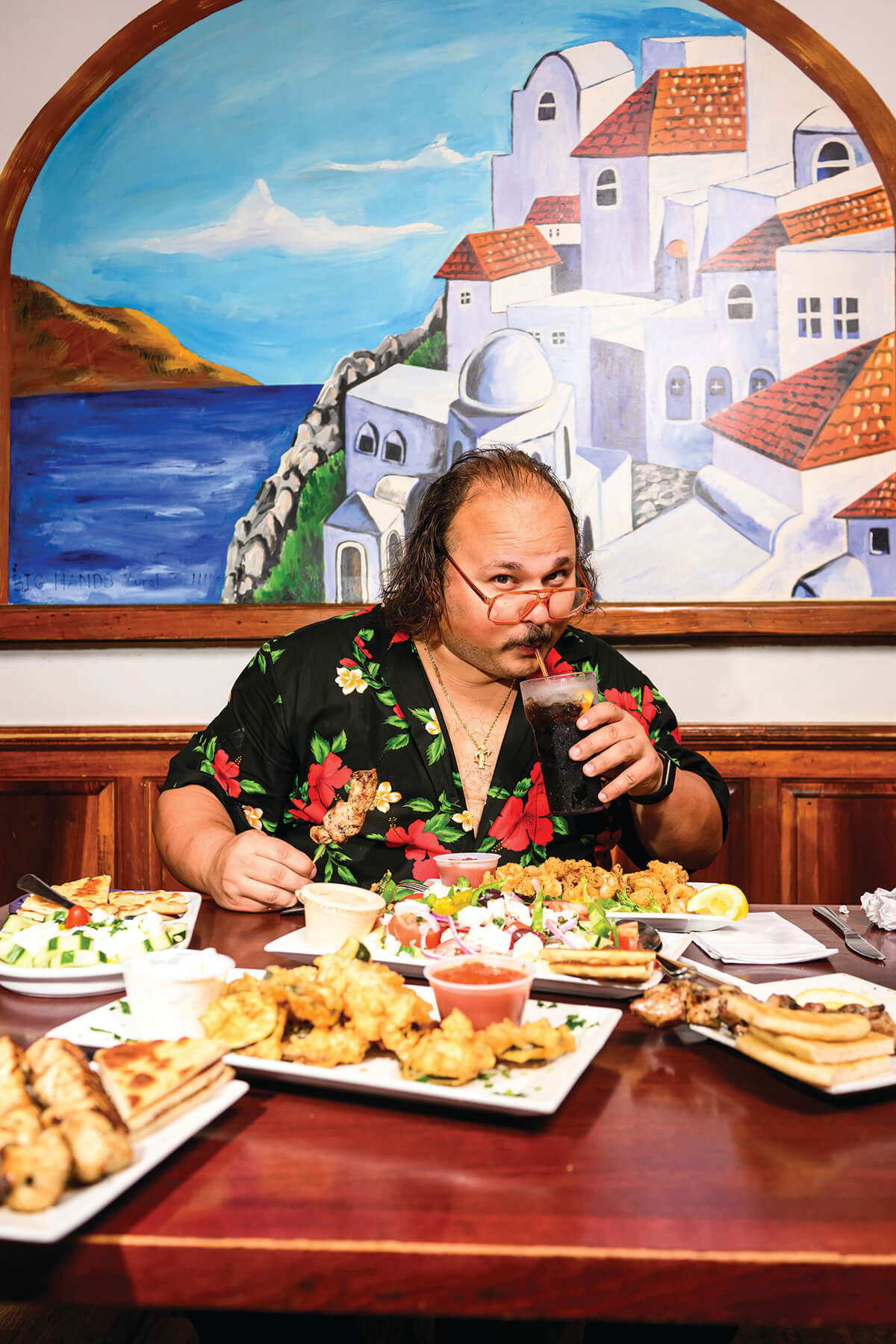
Halkias
grabs a bite at Samos Restaurant on Oldham Street.
Halkias was a big baby. Eight pounds, 11 ounces at birth. A smart and precocious kid, he was forming sentences in Greek as a 1-year-old, according to his mother, Veta. He loved attention, once taking the stage as a 3-year-old at the Greektown Festival to sing. When his younger twin brothers were born, he resented the attention they received.
“I used to tell him, ‘You’re my helper.’ One time I told him to bring me some diapers, and when he gave them to me, he said, ‘I quit,’” Veta recalls, laughing. It’s a familiar sound, almost exactly like her son’s. Halkias’ laugh—rich, genuine, crescendoing—is one of his trademarks. It starts as a rhythmic chuckle before increasing in tempo and volume as his head sways from side to side before ultimately tipping back for a final cackle. His lifelong friend, Eldis Sula, who now works as Halkias' podcast producer and tour manager, remembers it from their days as students at John Ruhrah Elementary School.
“I’ve known him for so long that I never really thought much about it until he started getting famous and people would comment on how boisterously he’s always laughing on podcasts or on stage,” Sula says. “My mom thought his laugh was hilarious. My sister would always refer to Stav’s ‘chipmunk laugh.’”
The only thing Halkias delighted in more than laughing himself was eliciting it from others. He’s always sought the limelight. He emceed an elementary-school talent show and auditioned for a play at Roland Park Middle School (he didn’t get the part). As a bigger kid, he was a target for bullies, but he always seemed to get the last laugh.
“Some of the funniest people in the world live in Baltimore and they’re good at cutting you down,” Halkias says. “In Baltimore City Public Schools, people are going to make fun of you, so you have to make fun of them. Sometimes I feel bad for the kids that I would get into verbal spats with, because in hindsight, very rarely does somebody that bullied you go pro at bullying people.”
He may not have looked the part, but growing up, Halkias was actually a pretty good athlete. He played rec soccer in Rosedale, which is where the inspiration for his Ravens super-fan character Ronnie was partly born.
Blindly optimistic when things are going well and apoplectic when they’re not, Ronnie is high on passion, low on intellect, and completely devoid of perspective. We all know fans like Ronnie. The character, who shows up on occasional semi-viral social-media posts, has become so beloved in Baltimore that the Ravens have even welcomed Halkias onto the field before games as a sort-of unofficial mascot.
“I know a lot about the white-trash suburbs of Baltimore, I spent a lot of time there,” he says. “That was a character I would do for my friends when I was growing up. The first time I ever did it on stage was at The Crown in Station North. I don’t know how it became so big, but I have friends at the games tell me they overhear people mention it. Every place has their own version of Ronnie.”
Part of what makes Ronnie so believable is Halkias’ genuine love for football. He was a very good defensive lineman in high school at Baltimore Polytechnic Institute. Wrestling was another story. He was on the team with his brother Nick, who was in it for the competition. Halkias just wanted to lose weight. The coach had a policy: If anyone swore, the entire team would have to do 25 push-ups. This was not a structure in which Halkias thrived. After the first grueling practice, Halkias, beet red and glistening, wearing only underwear, stepped onto a scale for a weigh-in.
“He looked hilarious,” Nick recalls. “He says, ‘Holy fucking shit, I lost 12 goddamn pounds.’ Our jaws dropped because now we have to do 75 push-ups. But he’s just so happy because this is the most weight he’s lost within a week, let alone two hours. He barely could do the push-ups. He was like, ‘Fuck it, I’m not doing these push-ups. My work is done.’”
Always a good student, Halkias attended UMBC on a full academic scholarship. His father, a carpenter, and mother, who repaired carpets and waited tables at the longtime favorite but recently shuttered Greektown restaurant Ikaros, held out hope that his loquaciousness and quick wit would lead him to a career as a lawyer. Instead, Halkias found himself barefoot wearing an undershirt and shorts when he did his first open mic in a common room of his college dorm. He bombed.
That winter, he worked on his timing and delivery at open mics in College Park and D.C. He was horrible—and completely hooked. He couldn’t wait to get back on that stage. But guilt consumed him. A nagging feeling that he was letting his parents down festered. So he quit comedy. Misery ensued.
Taking two years off, he focused on school and started going to therapy. From those sessions, he says, he realized that he couldn’t bury his love for stand-up, so he decided to go all in. Though somewhat supportive, his parents were understandably apprehensive about their son’s chosen career path. At least he’d have his college degree to fall back on. Or so they thought.
Before graduation, he gathered his brothers and made a huge confession: He was actually a few credits shy of graduating but was permitted to walk in the procession. “So he was like, ‘Pretend like I’m graduating and just congratulate me,’” recalls Nick, with a laugh.
It was almost a perfect plan—until his brother’s diploma came in the mail. “What happened to yours?” his mother asked. He was forced to come clean.
Despite speaking Greek, he never fulfilled the language requirement needed to earn his degree. He remains six credits short.

It takes balls to get on stage and try to make people laugh, says Andrew Unger, owner of Magoobys Joke House in Timonium. Every comic who’s ever tried it can attest to that. When Halkias entered the club’s new talent competition in his early 20s, he wasn’t polished, but he was determined.
“He had great timing, a lot of energy, and a natural stage presence,” Unger says. “He connected with the crowd in a way that not a lot of people do.”
After college, Halkias lived at home and worked as a paralegal, but he spent almost all his free time working on his act. He often hung out at Magoobys (and won its 2012 New Comedian of the Year award), performing and studying other more established comics. Robert Kelly was one of them.
“He was a little adorable, chubby Greek boy. And he hung around like he was grooming me,” says Kelly, 54. “He knew a 24-hour Korean barbecue. We went and ate at, I think, 2:30 in the morning. I think he took advantage of my fatness. He was like a drug dealer. . . . But the second you meet him, you’re like, ‘Oh, this kid’s different. He’s got something.’ He’s not trying to be famous, he’s trying to be funny. He never cared about what he looked like or what people thought of him. He just showed up. He wanted stage time. He wanted to go hang out with comics and have fun and make people laugh. He wanted to get on stage.”
@iammightymark Ronnie (@stavvybaby2 ) is coming for you. Ravens Going To The Super Bowl. Some Bmore Shit Right Here 😂😂😂. Side Note / Stavros Halkias : Fat Rascal Still Streaming On Netflix ( @netflixisajoke ) #bmoreclub #stavroshalkias #mightymark #ravens ♬ original sound - iammightymark
Before long, Halkias moved to New York and slowly began developing a following by opening for national acts like his mentor Kelly and Tom Papa. He performed at open mics and comedy clubs on weeknights. As his confidence grew, he started interacting more and more with the audience, a skill he’s become known for. In some corners of the comedy world, crowd work is belittled, considered a cover-up for thin material. In Halkias’ case, nothing could be further from the truth. When he talks to the crowd, it’s a two-way conversation, not a roast. Everyone’s in on the joke.
“Some comics are only looking for the laugh, they’re not giving the laugh,” Kelly says. “He’s a good laugher. If something’s funny, he enjoys it. He listens. And he enjoys funny shit.”
While Halkias was improving, he still wasn’t making much money, and at times it felt like his career wasn’t gaining traction. Then came Cum Town.
It’s an attention-grabbing name for a podcast, to be sure. (Halkias’ mom says that when she first heard it, she didn’t know what it meant and had to Google it.) Shock value is exactly what comedian Nick Mullen was going for when he came up with it in 2016. Halkias and, soon after, Adam Friedland, became co-hosts, and the show changed the trajectory of their lives.
Gaining a loyal following of hardcore comedy nerds who delighted in the trio’s unscripted raunch, chemistry, and lack of filter about their own lives, it eventually racked up so many Patreon subscribers that they were reportedly making tens of thousands of dollars. The show’s reach was so wide that the three recorded live episodes in Australia, where fans showed up dressed as their favorite host. It also occasionally delved into serious topics and current events, which attracted attention from the mainstream media. A 2021 New Yorker article cited it as part of the so-called “dirtbag left.” As GQ recalled earlier this year, “Cum Town was a parasocial obsession and the peak of comedy forever.”
“We were really lucky that we had a funny show, and it hit just at the right time,” Halkias says. “We were 26-year-olds with nothing to lose, saying wild shit. There were so many things that should have doomed the podcast, but those are the things people love about it.”
Six years after the show debuted, Halkias decided to walk away. Yet to this day, it maintains a cult following. The March Stavvy’s World episode that reunited the co-hosts has 1.2 million views.
Heady stuff for three buddies who at the core of it were just trying to make each other laugh. But in the end, his muse—standup—continued to call.
“The show was fucking fun for a while, and then, you know I was like, ‘Damn, am I going to be the Cum Town guy when I’m 40? When the brand is semen?’” he later said on the podcast This Past Weekend with Theo Von. “I just wanted to do my own thing.”
In 2022, Halkias released his first stand-up special, Live at the Lodge Room, on his YouTube channel. A year later, his first Netflix special, Fat Rascal, dropped. His profile had never been higher. He was killing on stage, but off it, he felt like he was about to die.
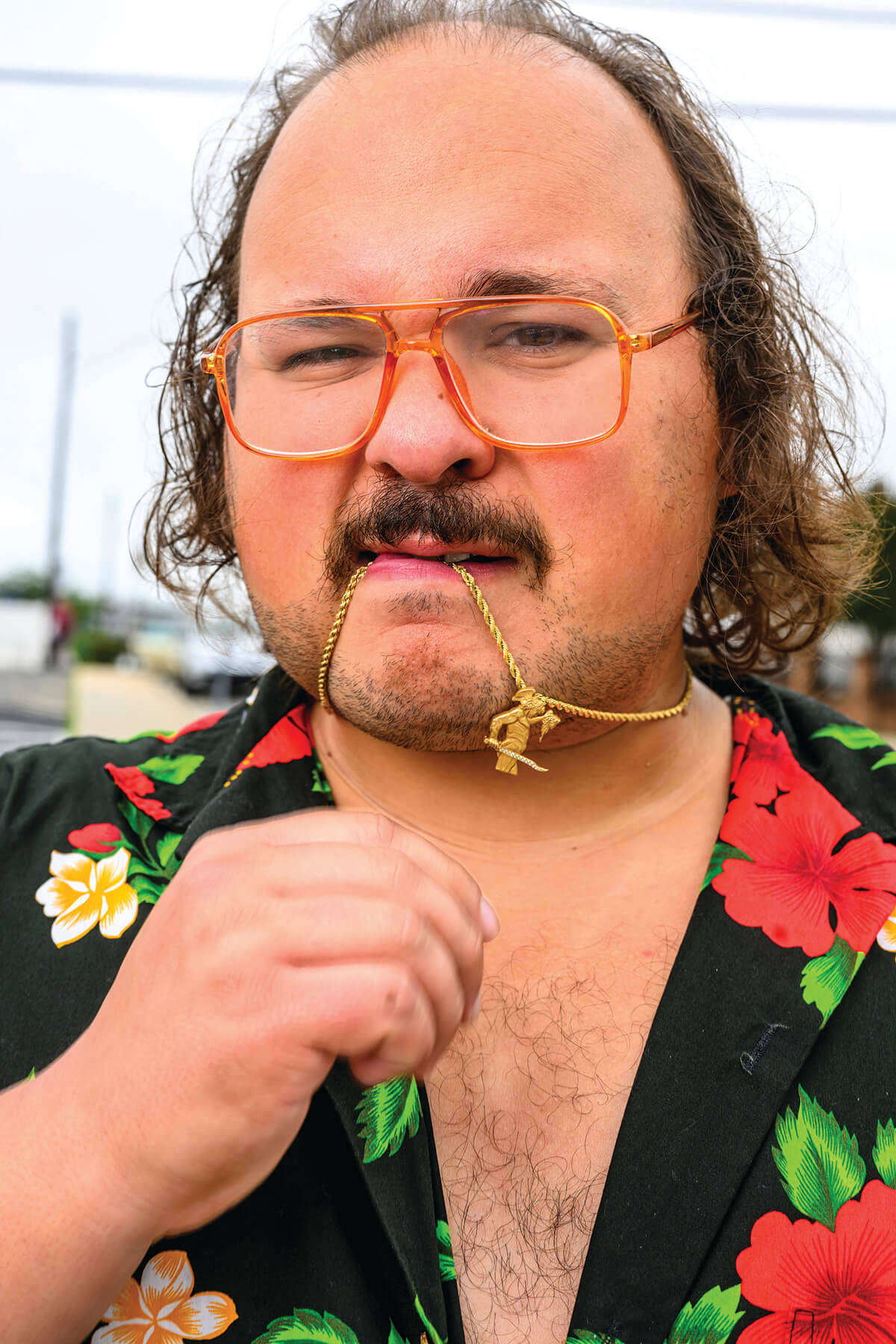
Weight has always had a major presence in Halkias’ life. He’s used it to develop a public persona and disarm audiences. By making fun of himself, he convinces the crowd to relax and allow him to make fun of them as well. But by 2023, his weight ceased to be a laughing matter.
After his specials came out, he shot the first season of Tires and Let’s Start a Cult, a movie he co-wrote and co-stars in that’s available on Hulu.
“I felt physically horrific that whole time,” he says. “I allowed myself to slip because I was so focused on work and all these opportunities. I don’t ever want to do that, because what’s the point? Let’s say all that good stuff happened and I fucking died that year. Who gets to enjoy it? I’m at that point now where I’ve already exceeded the dreams I had when I was a kid. Now it’s like, ‘Well, why don’t we try and be a fully formed human being? Let's be healthy. Let’s stick around for a while.’”
He took almost a year off from the road—and from partying—and spent much of that time in Baltimore, walking on the treadmill in his basement, along the waterfront in Canton, and in Patterson Park. In his YouTube series Stavvy Gets Ripped, he works his ass off. While he doesn’t so much get ripped, he does become less rippled.
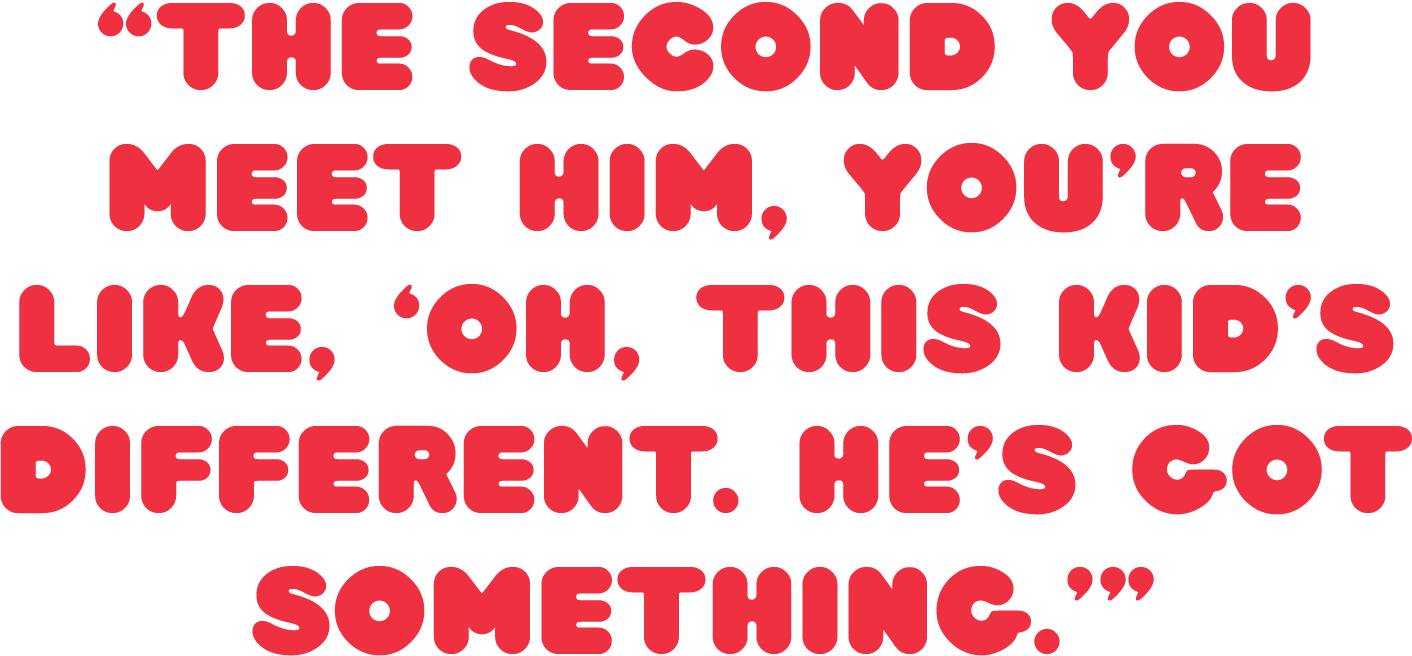
During The Dreamboat Tour this past year, he brought along a friend to help him eat well. At the end of it, he weighed 290 pounds, well under his goal of 300.
“This was the first tour of my life where I lost weight,” he says between sips of Dr. Pepper Zero. “But this is the most dangerous time, because when you’re on tour, you can focus on the work. I’m trying to keep those habits, but yesterday I was like, ‘Let’s go eat some fucking pit beef and fries.’”
That he resisted that urge and opted instead for a walk to Fells Point, where he ate salmon at Sal & Sons in Broadway Market, he considers a minor victory. These days, you’re more likely to see him at Sushibruce Ya on Aliceanna Street or Pho Bac on South Potomac than at Chaps.
Whatever rest Halkias manages to catch up on in the coming weeks, it will be short-lived. The stand-up tour resumes in September with dates in London, Dublin, and Glasgow before it returns to the U.S. for stops throughout the South. In October, Academy Award-winning director Yorgos Lanthimos releases his latest feature film, Bugonia. It stars Emma Stone, who won an Oscar for the Lanthimos-directed Poor Things, and Jesse Plemons, who was nominated for his performance in 2022’s The Power of the Dog.
What does that have to do with Halkias? He’s in it.
“I’m in the park, eating sushi with a friend, and I get a call. ‘Yorgos wants to meet with you,’” he recalls. “I was like, ‘What the fuck are you talking about?’ I guess he saw my special. He works with a lot of comedians. It was out of the fucking blue, dude, and it was the coolest thing that’s ever happened to me, without question.”
He scoffs when he’s asked if he’s ever taken acting lessons. And his answer is quintessential Stavvy: honest, fearless, and funny.
“Never. Sixth grade, baby—that’s my formal training,” he says. As for his method on set: “They tell me what the role is, I think about it, and I try my fucking best.”
At this point, he hadn’t seen the movie yet. But he was confident that his scenes wouldn’t get cut.
“I’m not a main character,” he says, “but I’m pretty crucial.”
